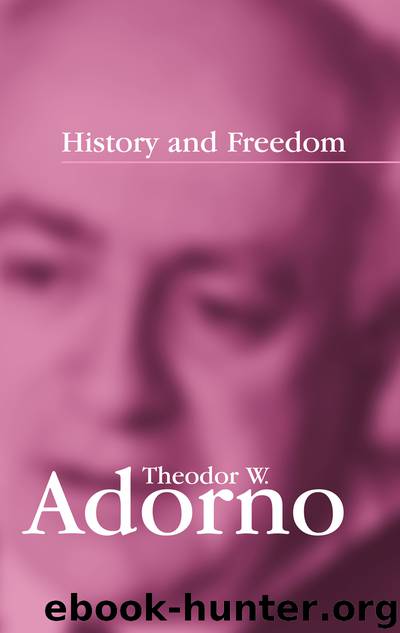History and Freedom by Theodor W. Adorno

Author:Theodor W. Adorno
Language: eng
Format: epub
ISBN: 9780745630120
Published: 2014-08-26T15:08:53+00:00
Notes
1 The proposition that the middle and later Schelling ‘made extensive reference to the concept of allegory’ is scarcely sustainable. In all probability, Adorno believed that Schelling's ‘interpretative’ or, better, ‘narrative’ approach to religion and myths of the gods in his late lectures on ‘The Philosophy of Mythology’ and ‘Philosophical Revelation’ had affinities with what he himself called allegory, following his reading of Benjamin's book on tragic drama. For his views on Schelling's later philosophy, cf. Metaphysics, pp. 138 and 166 (note 4).
2 See p. 125, above.
3 The reference to Hölderlin has not been found.
4 The term ‘the unhappy consciousness’ derives from The Phenomenology of Spirit, where it refers to a ‘new shape’ of consciousness following on from Stoicism and Scepticism: ‘This new attitude consequently is one which is aware of being the double consciousness of self as self-liberating, unalterable, self-identical, and as utterly self-confounding, self-perverting; and this new attitude is the consciousness of this contradiction in the self’ (The Phenomenology of Spirit, p. 250). It has been shown that the concepts Hegel used to characterize the unhappy consciousness have their roots in the gnostic tradition. (Cf. F. Fulda, the article on ‘Consciousness, unhappy’, in Historisches Wörterbuch der Philosophie, vol. 1, Basel and Stuttgart, 1971, col. 905.) By using the term ‘unhappy consciousness’ to describe the kind of thinking that passively refrains from criticism and rests content, at home with itself, as ‘unhappy consciousness’, Adorno takes sides with the idea of philosophy as critique and against gnostic ideas in any form (see lecture 22, note 10, below). In Negative Dialectics, Hegel's inconsistency is explained by an ‘urge to incapacitate the critical element that becomes entwined with the individual mind. Particularizing this, he came to feel the contradiction between the concept and the particular. The individual consciousness is almost always the unhappy one, and with good reason’ (Negative Dialectics, p. 45). Thus, on the one hand, the unhappy consciousness was a critical concept for Adorno, while, on the other, he can say that it is the theatre of those experiences from which something like mind is generated: ‘The unhappy consciousness is not a delusion arising from the mind's vanity but something inherent in the mind, the one authentic dignity it has received in its separation from the body’ (ibid., p. 203, translation altered).
5 A reference to the verse from Karl Kraus quoted in lecture 7, note 12.
6 See his essay ‘Parataxis’, in Notes to Literature, vol. 2, p. 111f.
7 Friedrich Beissner was the editor of the standard edition of Hölderlin's works (the Große Stuttgarter Ausgabe, 1951–). The text of the poem in Richard Sieburth's translation reads: ‘The forest sinks off / And like buds, the leaves / Hang inward, to which / The valley floor below / Flowers up, far from mute, / For Ulrich passed through / These parts, a great destiny / often broods over his footprint, / Ready, among the remains.’ Quoted in Notes to Literature, vol. 2, p. 111n., from Friedrich Hölderlin, Hymns and Fragments, trans. Richard Sieburth, Princeton, NJ: Princeton University Press, 1984, p.
Download
This site does not store any files on its server. We only index and link to content provided by other sites. Please contact the content providers to delete copyright contents if any and email us, we'll remove relevant links or contents immediately.
The Secret History by Donna Tartt(19047)
The Social Justice Warrior Handbook by Lisa De Pasquale(12186)
Thirteen Reasons Why by Jay Asher(8892)
This Is How You Lose Her by Junot Diaz(6875)
Weapons of Math Destruction by Cathy O'Neil(6264)
Zero to One by Peter Thiel(5786)
Beartown by Fredrik Backman(5737)
The Myth of the Strong Leader by Archie Brown(5496)
The Fire Next Time by James Baldwin(5431)
How Democracies Die by Steven Levitsky & Daniel Ziblatt(5213)
Promise Me, Dad by Joe Biden(5141)
Stone's Rules by Roger Stone(5080)
A Higher Loyalty: Truth, Lies, and Leadership by James Comey(4950)
100 Deadly Skills by Clint Emerson(4919)
Rise and Kill First by Ronen Bergman(4778)
Secrecy World by Jake Bernstein(4740)
The David Icke Guide to the Global Conspiracy (and how to end it) by David Icke(4699)
The Farm by Tom Rob Smith(4502)
The Doomsday Machine by Daniel Ellsberg(4484)
